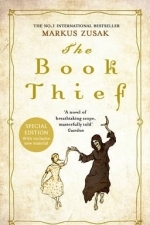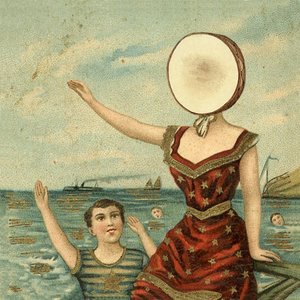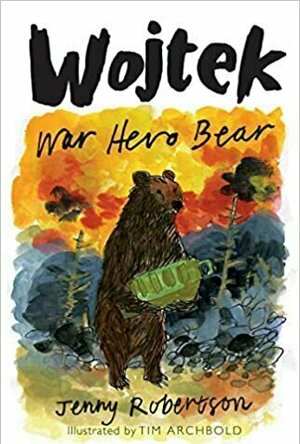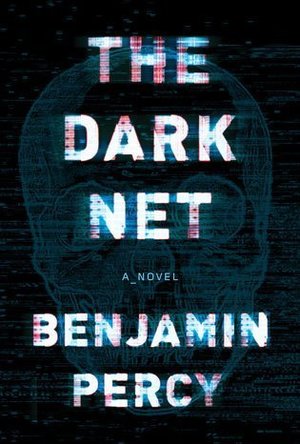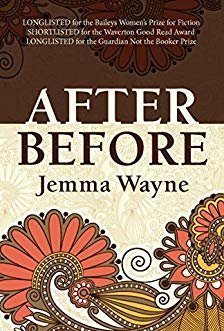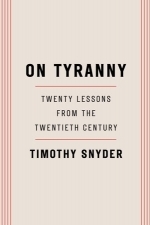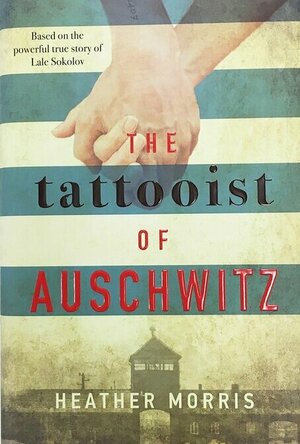Search
Becs (244 KP) rated The Book Thief in Books
Oct 2, 2019
I have no idea why I didn’t pick The Book Thief up sooner. It was honestly one of the best novels I’ve read so far this year. Scratch that, probably even one of the best novels I’ve read in my entire lifetime. Well, it might actually be a very close second to Six of Crows by Leigh Bardugo haha.
One thing that I enjoyed while reading was the narrator of the story (death himself) and all the little bits that are thrown throughout the text like this:
***THE ONLY THING WORSE THAN A BOY WHO HATES YOU***
A boy who loves you.
The author takes such a serious and sad topic and throws in love, sarcasm, and happiness. This was such a well rounded, beautiful and classic novel that I just couldn’t put it down. I loved every second of it, even though at first I was a little skeptical. But that’s only because I was in such a sour mood and reading slump when I started The Book Thief.
If you’re looking for a fast read, don’t read this. This took time to read and to understand. To process all that was going on. Markus Zusak doesn’t write The Book Thief in a morbid way that most books about the Holocaust are written, but instead with humor and love and happiness. The good and the bad all intermingled together to create an amazing book that I will be recommending to everybody from now on.
I cried. I laughed. I got pissed. I was stricken with grief, with pain, and with love. I felt that I went through almost every emotion that my body has while reading The Book Thief. And I honestly wanted more.
I wanted more of Liesel’s story after being the only one to survive on Himmel Street. I wanted spin-offs of Rudy and Liesel developing a relationship as they became teenagers and giving me that love story with a tragic back story. I wanted so much more but at the same time, I was content and happy with how the novel ended. I wouldn’t have changed anything about The Book Thief and I will most definitely be rereading it very soon. This is a book that will be cherished for an eternity.
If you haven’t picked up The Book Thief yet, please drop what you’re doing and read it. It will most defiantly change your life.
“And it would show me, once again, that one opportunity leads directly to another, just as risk leads to more risk, life to more life, and death to more death.”
One thing that I enjoyed while reading was the narrator of the story (death himself) and all the little bits that are thrown throughout the text like this:
***THE ONLY THING WORSE THAN A BOY WHO HATES YOU***
A boy who loves you.
The author takes such a serious and sad topic and throws in love, sarcasm, and happiness. This was such a well rounded, beautiful and classic novel that I just couldn’t put it down. I loved every second of it, even though at first I was a little skeptical. But that’s only because I was in such a sour mood and reading slump when I started The Book Thief.
If you’re looking for a fast read, don’t read this. This took time to read and to understand. To process all that was going on. Markus Zusak doesn’t write The Book Thief in a morbid way that most books about the Holocaust are written, but instead with humor and love and happiness. The good and the bad all intermingled together to create an amazing book that I will be recommending to everybody from now on.
I cried. I laughed. I got pissed. I was stricken with grief, with pain, and with love. I felt that I went through almost every emotion that my body has while reading The Book Thief. And I honestly wanted more.
I wanted more of Liesel’s story after being the only one to survive on Himmel Street. I wanted spin-offs of Rudy and Liesel developing a relationship as they became teenagers and giving me that love story with a tragic back story. I wanted so much more but at the same time, I was content and happy with how the novel ended. I wouldn’t have changed anything about The Book Thief and I will most definitely be rereading it very soon. This is a book that will be cherished for an eternity.
If you haven’t picked up The Book Thief yet, please drop what you’re doing and read it. It will most defiantly change your life.
“And it would show me, once again, that one opportunity leads directly to another, just as risk leads to more risk, life to more life, and death to more death.”
Blaine Harrison recommended track In the Aeroplane Over the Sea by Neutral Milk Hotel in In the Aeroplane Over the Sea by Neutral Milk Hotel in Music (curated)
BookInspector (124 KP) rated Wojtek: War Hero Bear in Books
Sep 24, 2020
More reviews at https://bbookinspector.wordpress.com
Well, I think this book is classified as a children’s read, but I noticed, that you should have pretty good knowledge in history, in order to understand what is going on in here. I picked up this book after reading a Holocaust memoir, so it was a very nice continuation to my reading theme. 😀
When Piotr, a polish soldier, discovers an abandoned bear cub, he decides to take him along on his journey to Palestine. But he discovers, that after losing his family to the Soviet regimen, Piotr feels very lonely, and Wojtek’s presence comforts not only him but other soldiers as well. I really liked the characters in this book, I found them charming, warm and pleasant personalities. I really enjoyed that author used multiple perspectives in this novel, I really loved reading Wojtek’s parts, I found them cute and funny. I loved the parts, were author shared Piotr’s story with the readers. It is a very sad story involving concentration camps and betrayal, but these parts made the whole book more complex and more interesting for me. (as an adult with some knowledge of history…)
The narrative follows the army squad accompanied by Wojtek, through their journeys in the middle east, and is very fun to read. I have to agree, Wojtek is a very funny and smart bear, and I loved all his mishaps. The author has done a great research for this novel, however, sometimes it felt like reading a history book, filled with war terminology and facts. Another aspect I really enjoyed was the pictures, Tim Archbold did a great job on them. I am glad that every chapter had a picture, and I was curious to find out, which scene from that chapter he decided to illustrate. 🙂
The writing style of this book was pretty straightforward, and it was quite easy and enjoyable for me. The chapters were a decent length and the pictures helped to make it more entertaining and playful. I did enjoy the setting of this book, it changes continuously, bringing in different scenery and atmosphere. I think that the ending was very realistic and believable for this novel, but some aspects left me a little bit upset with Piotr. So, to conclude, It is a great read for children as well as adults, especially if your child is learning about WWII, I think it would widen up their knowledge and you would have great fun reading it as well. Win-win situation. 😀 This novel has amusing characters as well as lots of serious and fun moments, and I do recommend to give this book a try. Enjoy 🙂
Well, I think this book is classified as a children’s read, but I noticed, that you should have pretty good knowledge in history, in order to understand what is going on in here. I picked up this book after reading a Holocaust memoir, so it was a very nice continuation to my reading theme. 😀
When Piotr, a polish soldier, discovers an abandoned bear cub, he decides to take him along on his journey to Palestine. But he discovers, that after losing his family to the Soviet regimen, Piotr feels very lonely, and Wojtek’s presence comforts not only him but other soldiers as well. I really liked the characters in this book, I found them charming, warm and pleasant personalities. I really enjoyed that author used multiple perspectives in this novel, I really loved reading Wojtek’s parts, I found them cute and funny. I loved the parts, were author shared Piotr’s story with the readers. It is a very sad story involving concentration camps and betrayal, but these parts made the whole book more complex and more interesting for me. (as an adult with some knowledge of history…)
The narrative follows the army squad accompanied by Wojtek, through their journeys in the middle east, and is very fun to read. I have to agree, Wojtek is a very funny and smart bear, and I loved all his mishaps. The author has done a great research for this novel, however, sometimes it felt like reading a history book, filled with war terminology and facts. Another aspect I really enjoyed was the pictures, Tim Archbold did a great job on them. I am glad that every chapter had a picture, and I was curious to find out, which scene from that chapter he decided to illustrate. 🙂
The writing style of this book was pretty straightforward, and it was quite easy and enjoyable for me. The chapters were a decent length and the pictures helped to make it more entertaining and playful. I did enjoy the setting of this book, it changes continuously, bringing in different scenery and atmosphere. I think that the ending was very realistic and believable for this novel, but some aspects left me a little bit upset with Piotr. So, to conclude, It is a great read for children as well as adults, especially if your child is learning about WWII, I think it would widen up their knowledge and you would have great fun reading it as well. Win-win situation. 😀 This novel has amusing characters as well as lots of serious and fun moments, and I do recommend to give this book a try. Enjoy 🙂
Zuky the BookBum (15 KP) rated The Dark Net in Books
Mar 15, 2018
I really think that the synopsis for this book is not up to scratch! Although, yes, the synopsis is what initially drew me to this book, after reading it I can say that the book is <i><b>WAY</b></i> better than the synopsis would make you believe!
This book tackles the subject of good and evil, with references to demons and black magic which I didnt get at all from the synopsis! I was expecting this to have a much deeper involvement with the dark net, whats on it and how its used. While yes, there is that to the book, its not necessarily its main focus.
To begin with, this lack of talk about the dark net actually made me hesitant about the book. I was expecting something so much different to what I was reading, I felt really disappointed. But, that feeling didnt last for long. This is so unlike anything Ive ever read before and that made everything about this book really exciting. Not to mention, this is a super clever book! It uses real life scenarios that we can all relate to, or at least know about, and explains it with a black magic twist.
For example, when talking about demon possession, it explains how small demons can take over and that causes a man to plow a lorry through a busy crowd, or a school shooting a one off awful occasion in history. But when a big, strong demon comes along, it can posses not only a person, but a nation. It uses examples of the Holocaust and the Rwandan Genocide, which I thought was really smart!
Characters in this book were excellent, but there were quite a lot of them that we needed to get to know. Juniper was by far my favourite of the bunch, Sarin coming in at a close second. I loved that there was a strong, bad-ass female character who wasnt irritating (Lela, Im looking at you!).
As for the story, I will say that it feels a bit all over the place at times. Its not difficult to wrap your head around but there are a lot of things pulled in to the story at different times and this sometimes got a bit manic. This is classed as a horror novel, and for me, there definitely were some creepy bits. The hounds especially made my skin crawl.
Overall, I ended up really loving this novel. It was short and sweet (although it almost took me a whole 7 days to read), and it was exciting, creepy and fast-paced! A great novel for anyone who likes a darker thriller. Lots of gruesome deaths and bad-ass characters.
<i>Thanks to BookBridgr and Hodder & Stoughton for sending me an ARC in exchange for an honest review.</i>
This book tackles the subject of good and evil, with references to demons and black magic which I didnt get at all from the synopsis! I was expecting this to have a much deeper involvement with the dark net, whats on it and how its used. While yes, there is that to the book, its not necessarily its main focus.
To begin with, this lack of talk about the dark net actually made me hesitant about the book. I was expecting something so much different to what I was reading, I felt really disappointed. But, that feeling didnt last for long. This is so unlike anything Ive ever read before and that made everything about this book really exciting. Not to mention, this is a super clever book! It uses real life scenarios that we can all relate to, or at least know about, and explains it with a black magic twist.
For example, when talking about demon possession, it explains how small demons can take over and that causes a man to plow a lorry through a busy crowd, or a school shooting a one off awful occasion in history. But when a big, strong demon comes along, it can posses not only a person, but a nation. It uses examples of the Holocaust and the Rwandan Genocide, which I thought was really smart!
Characters in this book were excellent, but there were quite a lot of them that we needed to get to know. Juniper was by far my favourite of the bunch, Sarin coming in at a close second. I loved that there was a strong, bad-ass female character who wasnt irritating (Lela, Im looking at you!).
As for the story, I will say that it feels a bit all over the place at times. Its not difficult to wrap your head around but there are a lot of things pulled in to the story at different times and this sometimes got a bit manic. This is classed as a horror novel, and for me, there definitely were some creepy bits. The hounds especially made my skin crawl.
Overall, I ended up really loving this novel. It was short and sweet (although it almost took me a whole 7 days to read), and it was exciting, creepy and fast-paced! A great novel for anyone who likes a darker thriller. Lots of gruesome deaths and bad-ass characters.
<i>Thanks to BookBridgr and Hodder & Stoughton for sending me an ARC in exchange for an honest review.</i>
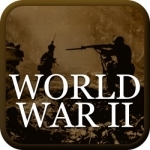
World War 2 History: WW2 Lite
Book and Reference
App
A very comprehensive App on World War II made specifically for the iPad. Brings World War 2 alive on...
Marylegs (44 KP) rated After Before in Books
Aug 14, 2019
I received After Before, a while ago as a first reads book. I started it a while ago, but have recently re-picked it up and became completely engrossed by it. The pause in reading this book was not based on how engaging I found this book. But rather I was focused on other books I was reading. Once I dedicated my time to this book however, I couldnt stop. When I wasnt reading it I was thinking out it, and it was based actually about a point of history I didnt know about, or at least didnt know a lot about.
The book focuses on three women, who through chance are pulled into each others lives. There is Vera, newly engaged and newly discovering her faith in god. Her fiancé Luke, a devote Christian is helping her to change her life for the better, to move forward and overcome her past. But there is so much more to her past than she has told Luke and she finds it impossible to move on and become better while she still hold onto these secrets. Luke is Veras link to Lynn, his mother, who has found out she has terminal cancer and has to relinquish her control on the life. As she comes to terms with her illness and what will be her untimely death she relives elements of her life that she resents and was unable to achieve because of the choices she made. Vera tries to help care for Lynn, but the two cannot come to terms with each other and so Emily, originally from Rwanda, is brought in to care for Lynn. Emily is a survivor of the Rwandan genocide, and has not come to terms with all that she has seen, or what was done to her. She drifts through her life never wanting to remember her past but forever at its whim. The story flits back and forth through the present and the past for each of the three women. All with different stories but all in pain and unable to let go.
I found Emilys story the most interesting, I could have read a book just about her and how she learns to deal with the horrible event that has overtaken her life. Her flash backs are so well written, graphic in places, but dignified to the history that these people have to live with. We hear a lot about the injustice and the horror of the holocaust, which happened in the Second World War. But learning about the Rwandan Genocide through Emilys 12 year old eyes really touched me. I could feel the fear building, know what was to happen but having to control over it. Knowing that the people who were yesterday your friends are no longer that.
This is a brilliantly written book about forgiveness. That without forgiveness, whether that is for yourself, through god, or for other people, that you will not be able to move on and truly live. Would highly recommend it is however not a light-hearted or emotionally easy read.
The book focuses on three women, who through chance are pulled into each others lives. There is Vera, newly engaged and newly discovering her faith in god. Her fiancé Luke, a devote Christian is helping her to change her life for the better, to move forward and overcome her past. But there is so much more to her past than she has told Luke and she finds it impossible to move on and become better while she still hold onto these secrets. Luke is Veras link to Lynn, his mother, who has found out she has terminal cancer and has to relinquish her control on the life. As she comes to terms with her illness and what will be her untimely death she relives elements of her life that she resents and was unable to achieve because of the choices she made. Vera tries to help care for Lynn, but the two cannot come to terms with each other and so Emily, originally from Rwanda, is brought in to care for Lynn. Emily is a survivor of the Rwandan genocide, and has not come to terms with all that she has seen, or what was done to her. She drifts through her life never wanting to remember her past but forever at its whim. The story flits back and forth through the present and the past for each of the three women. All with different stories but all in pain and unable to let go.
I found Emilys story the most interesting, I could have read a book just about her and how she learns to deal with the horrible event that has overtaken her life. Her flash backs are so well written, graphic in places, but dignified to the history that these people have to live with. We hear a lot about the injustice and the horror of the holocaust, which happened in the Second World War. But learning about the Rwandan Genocide through Emilys 12 year old eyes really touched me. I could feel the fear building, know what was to happen but having to control over it. Knowing that the people who were yesterday your friends are no longer that.
This is a brilliantly written book about forgiveness. That without forgiveness, whether that is for yourself, through god, or for other people, that you will not be able to move on and truly live. Would highly recommend it is however not a light-hearted or emotionally easy read.
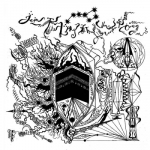
Primal Incinerators Of Moral Matrix by Tetragrammacide
Album Watch
IRON BONEHEAD PRODUCTIONS is proud to present TETRAGRAMMACIDE's massively anticipated debut album,...
metal
Goddess in the Stacks (553 KP) rated On Tyranny: Twenty Lessons From The Twentieth Century in Books
Jan 11, 2018
An excellent book full of warnings
On Tyranny is a short little book. I don't think it needs to be longer - it's easy to read, succinct, and is meant to serve as a warning. If anyone wants to learn more about any of the twenty lessons, there are plenty of resources for that. It's simply "HEY. This happened before. And this happened before. And this happened before and YOU NEED TO SEE THESE SIMILARITIES." It was a very quick read, but has left me with a lot to think about.
The format is simple: Twenty sections, each beginning with a lesson title and a short summary paragraph, then going into more detail in the next two to three pages. For example:
Do Not Obey In Advance.
Most of the power of authoritarianism is freely given. In times like these, individuals think ahead about what a more repressive government will want, and then offer themselves without being asked. A citizen who adapts in this way is teaching power what it can do.
The next few pages talk about Austrian Nazis rounded up Jews and used them as forced labor, before the German government told them to. When Jewish businesses were marked as such, people immediately started avoiding them. Anticipatory obedience. (Relate this to the suddenly overt racism and Nazi marches we're now facing in the US - where that used to be hidden.)
Another example:
Take Responsibility For The Face Of The World.
The symbols of today enable the reality of tomorrow. Notice the swastikas and the other signs of hate. Do not look away, and do not get used to them. Remove them yourself and set an example for others to do so.
The next pages talk about propaganda, and signs. If we tolerate swastikas, we imply that we accept them. That we support them. And if the oppressed groups that those swastikas are aimed at see everyone around them supporting them, who do they look to for help? All it takes is one person deciding to scrub off or paint over the swastika, for people around them to realize that's a thing that can be done. This plays into another section, which talked about Standing Out. Do the thing that makes you stand out - whether that's standing up for a minority, or scrubbing swastikas off walls, or attending a protest. If you don't stand out, you're too easily ignored as part of the problem.
This book had lots of holds at my local library - while I was sad to have to wait so long, I was pleased that so many people wanted to read it. I was 35th in line at one point! Just knowing that so many people want to read it is a little reassuring. The author has written several books on the Holocaust, WWII, and the rise of Hitler, so he knows what he's talking about, and it shows in his writing.
On Tyranny is a quick read and does an amazing job of boiling a lot of complicated concepts down into very succinct little points. I definitely recommend it as a jumping off point. Just don't let it be all you read.
You can find all my reviews at http://goddessinthestacks.wordpress.com
The format is simple: Twenty sections, each beginning with a lesson title and a short summary paragraph, then going into more detail in the next two to three pages. For example:
Do Not Obey In Advance.
Most of the power of authoritarianism is freely given. In times like these, individuals think ahead about what a more repressive government will want, and then offer themselves without being asked. A citizen who adapts in this way is teaching power what it can do.
The next few pages talk about Austrian Nazis rounded up Jews and used them as forced labor, before the German government told them to. When Jewish businesses were marked as such, people immediately started avoiding them. Anticipatory obedience. (Relate this to the suddenly overt racism and Nazi marches we're now facing in the US - where that used to be hidden.)
Another example:
Take Responsibility For The Face Of The World.
The symbols of today enable the reality of tomorrow. Notice the swastikas and the other signs of hate. Do not look away, and do not get used to them. Remove them yourself and set an example for others to do so.
The next pages talk about propaganda, and signs. If we tolerate swastikas, we imply that we accept them. That we support them. And if the oppressed groups that those swastikas are aimed at see everyone around them supporting them, who do they look to for help? All it takes is one person deciding to scrub off or paint over the swastika, for people around them to realize that's a thing that can be done. This plays into another section, which talked about Standing Out. Do the thing that makes you stand out - whether that's standing up for a minority, or scrubbing swastikas off walls, or attending a protest. If you don't stand out, you're too easily ignored as part of the problem.
This book had lots of holds at my local library - while I was sad to have to wait so long, I was pleased that so many people wanted to read it. I was 35th in line at one point! Just knowing that so many people want to read it is a little reassuring. The author has written several books on the Holocaust, WWII, and the rise of Hitler, so he knows what he's talking about, and it shows in his writing.
On Tyranny is a quick read and does an amazing job of boiling a lot of complicated concepts down into very succinct little points. I definitely recommend it as a jumping off point. Just don't let it be all you read.
You can find all my reviews at http://goddessinthestacks.wordpress.com
Hazel (1853 KP) rated The Storyteller in Books
May 30, 2017
An Ethical Question
Jodi Picoult is the bestselling author of numerous novels, with My Sister’s Keeper being the most well known, perhaps. All of her stories are well written although it is still possible to notice improvements in the writing over the years right up until now with her latest, The Storyteller, which quite possibly could be her best yet.
Arguably, The Storyteller does not quite read as a Jodi Picoult novel is known to. This is, in part, because of the nature of the story. Most of her previous books deal with medical ethics and/or court cases, whereas this story contains neither. The Storyteller contains a combination of past and present - the main focus being on the Holocaust.
Four people narrate the novel: two in the present day and two giving an account of their experience during the Second World War. It begins with Sage Singer, a 25 year old, hermit-like woman with a disfiguring facial scar – the result of a terrible accident, one that also led to the death of her mother. For the past three years Sage has been participating in a grief group – a place where people who have lost loved ones can come together and talk about their feelings. After three years surely Sage would no longer need the help of the group? However she still attends, not because she finds it helpful, but for the opposite reason. She even says herself: “If it were helpful I wouldn’t still be coming.” It unfolds that she still blames herself for her mother’s death despite the reassurances that it was an accident and not her fault.
It is through the grief group that Sage meets an elderly man, Josef Weber. After becoming friendly and discovering that Sage comes from a Jewish family, Josef confesses to something terrible – he was a Nazi during the war. He killed people. He wants Sage to represent all the Jews he killed and forgive him. Then he wants her to help him die.
Whilst, Josef recounts his experience of being part of the Nazi party, another account is also given. Minka, Sage’s grandmother, describes the terrors she faced as an imprisoned Jew suffering fates such as the deaths of all her family and friends and her time in Auschwitz. Another element to the novel is the vampire story Minka wrote as a teenager. This is interspersed between the other chapters of the book. Unwittingly, Minka’s fictional tale reflects the alienation and destruction of the Jews. The final character is Leo who, like Sage, is narrating the present day, and trying to locate ex-Nazi members in order for them to be punished by the government.
One thing to praise Picoult for, not just in The Storyteller, but also in all her novels is the amount of in-depth research she undertakes to make her stories as accurate as possible even though they are fictional. Minka’s account was written is such a way that it was almost believable that Picoult had been there and experienced it herself. She even learnt to bake bread so that she could write from the point of view of a baker. This is pure dedication!
The Storyteller is an amazing, beautiful book, which is not purely an enjoyable read. It informs, shocks and stays with you for a long time. You will question your own morals and ability to forgive. Is anyone entirely evil? Is anyone entirely good? Perhaps we are both, so why should anyone have the right to treat others as inferior from themselves?
Arguably, The Storyteller does not quite read as a Jodi Picoult novel is known to. This is, in part, because of the nature of the story. Most of her previous books deal with medical ethics and/or court cases, whereas this story contains neither. The Storyteller contains a combination of past and present - the main focus being on the Holocaust.
Four people narrate the novel: two in the present day and two giving an account of their experience during the Second World War. It begins with Sage Singer, a 25 year old, hermit-like woman with a disfiguring facial scar – the result of a terrible accident, one that also led to the death of her mother. For the past three years Sage has been participating in a grief group – a place where people who have lost loved ones can come together and talk about their feelings. After three years surely Sage would no longer need the help of the group? However she still attends, not because she finds it helpful, but for the opposite reason. She even says herself: “If it were helpful I wouldn’t still be coming.” It unfolds that she still blames herself for her mother’s death despite the reassurances that it was an accident and not her fault.
It is through the grief group that Sage meets an elderly man, Josef Weber. After becoming friendly and discovering that Sage comes from a Jewish family, Josef confesses to something terrible – he was a Nazi during the war. He killed people. He wants Sage to represent all the Jews he killed and forgive him. Then he wants her to help him die.
Whilst, Josef recounts his experience of being part of the Nazi party, another account is also given. Minka, Sage’s grandmother, describes the terrors she faced as an imprisoned Jew suffering fates such as the deaths of all her family and friends and her time in Auschwitz. Another element to the novel is the vampire story Minka wrote as a teenager. This is interspersed between the other chapters of the book. Unwittingly, Minka’s fictional tale reflects the alienation and destruction of the Jews. The final character is Leo who, like Sage, is narrating the present day, and trying to locate ex-Nazi members in order for them to be punished by the government.
One thing to praise Picoult for, not just in The Storyteller, but also in all her novels is the amount of in-depth research she undertakes to make her stories as accurate as possible even though they are fictional. Minka’s account was written is such a way that it was almost believable that Picoult had been there and experienced it herself. She even learnt to bake bread so that she could write from the point of view of a baker. This is pure dedication!
The Storyteller is an amazing, beautiful book, which is not purely an enjoyable read. It informs, shocks and stays with you for a long time. You will question your own morals and ability to forgive. Is anyone entirely evil? Is anyone entirely good? Perhaps we are both, so why should anyone have the right to treat others as inferior from themselves?
Amanda (96 KP) rated The Tattooist of Auschwitz in Books
May 29, 2019
“If you wake up in the morning, it is a good day.”
So I thought about it, and I’ve decided to write my review for this book. I’ve never read books that center around The Holocaust. I never thought I would, because I’ve seen several movies and just the sheer graphics of it alone made me sad. I know this was supposed to be based on a true story, but I went into it with the mindset that it wasn’t true, because most times, some of those stories are fabricated for drama purposes. I’ve read that even Heather Morris added some things to the story for that reason, so again, I saw it as just another story.
The story centers around Lale who is transferred to Auschwitz, but is given the job as a tattooist. From the descriptions, he has to use a really awful needle and has to press down hard enough for the numbers to be seen and never removed – a highly painful process that he has to perform even on children. Then one day, he tattoos a lady that catches his eye, Gita, and from then on he plans to love her and marry her WHEN they get out of Auschwitz.
Off the bat, something about the writing kind of bothered. I couldn’t quite pin point what it was. I read somewhere that this book was originally written as a screen play and I think that was it. To me, the style had a vagueness to it that made it feel like some parts I was reading something from an old story book from when I was in high school. I’m not saying that style was terrible. This particular writing style is not my favorite to read.
I liked the premise of the story. I can’t begin to imagine what it was truly like in those camps. I can’t comment on it either, but like I said, I also didn’t go into this book thinking it was all a true story about these two people. So, there were some bits of the story that I had a hard time believing, but then again, I’m not sure if it was a true part or a fabrication part.
All in all, the story wasn’t bad. I felt so horribly for Lale having to have that job, but he survived, and Gita. The remembering of their families and wondering if they are alive or dead struck me a bit. I know I’ve said this, but I can’t imagine that kind of pain. I feel horrible whenever Lale thought of his mother.
“His mother he can see perfectly. But how do you say goodbye to your mother? The person who gave you breath, who taught you how to live?”
You can’t, that’s the answer.
The book didn’t live up to the hype, in my opinion, but Morris wrote a nice and moving story in the end. I know there are some other stories like this. One of my Twitter friends recommend the Librarian of Auschwitz, so perhaps I will see about that book.
I don’t believe I’ll be seeking out the sequel to this book. I do hope it’s better than the first, but the story is still good.
So I thought about it, and I’ve decided to write my review for this book. I’ve never read books that center around The Holocaust. I never thought I would, because I’ve seen several movies and just the sheer graphics of it alone made me sad. I know this was supposed to be based on a true story, but I went into it with the mindset that it wasn’t true, because most times, some of those stories are fabricated for drama purposes. I’ve read that even Heather Morris added some things to the story for that reason, so again, I saw it as just another story.
The story centers around Lale who is transferred to Auschwitz, but is given the job as a tattooist. From the descriptions, he has to use a really awful needle and has to press down hard enough for the numbers to be seen and never removed – a highly painful process that he has to perform even on children. Then one day, he tattoos a lady that catches his eye, Gita, and from then on he plans to love her and marry her WHEN they get out of Auschwitz.
Off the bat, something about the writing kind of bothered. I couldn’t quite pin point what it was. I read somewhere that this book was originally written as a screen play and I think that was it. To me, the style had a vagueness to it that made it feel like some parts I was reading something from an old story book from when I was in high school. I’m not saying that style was terrible. This particular writing style is not my favorite to read.
I liked the premise of the story. I can’t begin to imagine what it was truly like in those camps. I can’t comment on it either, but like I said, I also didn’t go into this book thinking it was all a true story about these two people. So, there were some bits of the story that I had a hard time believing, but then again, I’m not sure if it was a true part or a fabrication part.
All in all, the story wasn’t bad. I felt so horribly for Lale having to have that job, but he survived, and Gita. The remembering of their families and wondering if they are alive or dead struck me a bit. I know I’ve said this, but I can’t imagine that kind of pain. I feel horrible whenever Lale thought of his mother.
“His mother he can see perfectly. But how do you say goodbye to your mother? The person who gave you breath, who taught you how to live?”
You can’t, that’s the answer.
The book didn’t live up to the hype, in my opinion, but Morris wrote a nice and moving story in the end. I know there are some other stories like this. One of my Twitter friends recommend the Librarian of Auschwitz, so perhaps I will see about that book.
I don’t believe I’ll be seeking out the sequel to this book. I do hope it’s better than the first, but the story is still good.
